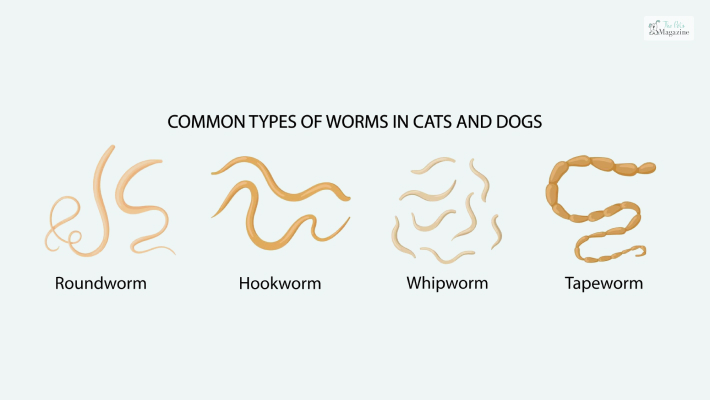How Long Can A Dog Have Worms Before It becomes fatal? Everything you need to know


Your dog has worms’ is a four-word horror story for every pet parent, and rightly so. Worms are very common in dogs and equally difficult to get rid of. Our dogs are curious animals by nature who like to explore and satisfy their curiosity by sniffing or licking unknown objects. Unfortunately, this is also how they pick up worms.
Worms can cause a lot of health concerns in dogs. These range from mild irritation to serious health issues like skin allergy, blood diarrhea, and anemia. If left untreated for a long time, worm infestation can even lead to death.
Naturally, the first question that arises when any responsible pet parent hears that their dog can get affected by worms are how do you know if your dog has worms and how long can a dog have worms before it dies. The answer to this question depends on several factors, such as the type of worm your dog has, the age, and your pooch’s health.
In this article, we will explore the most common types of worms found in dogs, symptoms of worm infestation, and treatment methods. Let’s dive in.
How Do Dogs Get Infected With Worms?
Here are some of the common ways in which dogs can get infected with worms:

From a mother to its puppies
Puppies generally contract worms from their mother. When a pregnant dog has worms, she can pass them on to her puppies through the placenta or while nursing. Roundworms and hookworms are the two most common types of worms that are passed from mother to puppies while they are still in utero or during nursing. That is why it’s crucial to deworm both the mother and the puppies regularly to prevent any potential health problems.
While grooming themselves
Dogs can also get infected by worms while grooming themselves. Roundworm eggs and fleas can get stuck to your dog’s fur during walks or when they are playing outside in the yard. When dogs groom themselves, they can easily swallow the roundworm eggs or fleas, which then grow into adult worms in their intestines.
Hunting infected animals
Dogs with a hunting instinct might catch and eat small rodents or birds that are infected with worms. Similarly, if you feed your dog raw meat that hasn’t been properly handled or cooked, it can also contain worm larvae that can infect your furry friend.
Coming into contact with infected objects
See Also: Cute and Courageous: All About Miniature Dachshunds
Type Of Worms That Dogs Get
As a responsible pet owner, it is crucial for you to be aware of the different types of worms that can commonly infect your pet. This will also enable you to understand how long can a dog have worms before it dies:

Roundworm
The two main roundworm species that affect dogs are Toxocara canis and Toxascaris leonina. Roundworms are tubular shaped and are white or light brown in color.
Roundworms often get transmitted from the mother to the puppies after birth or even when they are in utero.
This type of worm is commonly found in puppies because of its weak immune system. Around 90 percent of the puppies under three months are diagnosed with roundworms. Adult dogs can also get roundworms if they come into contact with infected feces.
These types of worms are found in the small intestine and can grow up to seven inches in length. Once inside the host’s (dog) body, they go through several stages of growth and finally become enclosed within a cyst in body tissues. Even if the adult dog is given deworming medication on a regular basis, some worms still remain dormant within the host’s body.
They only get activated if the host is a female dog and gets pregnant. Then they pass through the mother to her puppies. This is why puppies should be treated for roundworms from a very young age.
Tapeworms
Tapeworms are long, flat, and segmented worms found in the intestines of dogs and cats. The most common species of tapeworm that are found in dogs is known as Dipylidium caninum. Unlike other intestinal parasites, dogs do not get infected if they swallow or come into direct contact with tapeworm eggs in any other way.
Tapeworm infection in dogs is caused by fleas or rodents carrying tapeworm larvae. Fleas carrying the tapeworm egg get attached to a dog’s fur while they are playing or rolling around in the grass. Once the dog swallows the flea, the tapeworm egg hatches and attaches itself to the intestinal lining.
An adult tapeworm can grow up to 4 to 8 inches long. Once a tapeworm has completely matured, individual segments from the main body called proglottids fall off and pass through the dog’s feces.
Tapeworm infestation is not really harmful, but they cause mild irritation. In case of severe infestation, your dog may start scooting their bottom across the floor.
Heartworm
Out of all the common parasitic worms found in dogs, heartworms are the only ones that dogs don’t pick up from their environment. These worms are also not transmitted directly from one dog to another but through mosquito bites.
Mosquitoes ingest tiny immature worms called microfilaria when they bite an infected dog. The microfilaria grows for around 10-14 days within the mosquito’s body and then travels to its mouthpiece. The microfilaria then enters their host when the mosquito bites an uninfected dog.
The immature worms travel through the body and settle into the blood vessels on the right side of the heat. They take around six months to mature and can live for up to 7 years in the host’s body. They can grow up to 1 foot in length and reproduces at a rapid rate. Heartworm infestation can cause inflammation and damage the heart, arteries, and lungs.
Signs And Symptoms of Heartworm Infestation in Dogs:
- Mild, persistent cough: This can be a subtle sign, especially in young or less active dogs
- Getting tired easily during playtime: Your dog may tire more easily during walks or playtime.
- Lethargy: Your dog may seem less energetic or have decreased stamina.
- Weight loss: This can occur even if your dog’s appetite remains normal.
- Pale gums: This indicates a lack of oxygen reaching the tissues.
- Weakness or collapse: In severe cases, heartworm disease can lead to weakness, fainting, or even sudden death.
Hookworm
Hookworms are a type of intestinal parasite that is commonly found in warm and moist environments. They are called hookworms due to their bent head and mouthpart, which resemble a hook. These worms use their hook-like mouthpart to anchor themselves to the inner lining of their host’s intestinal wall.
They are only around 1-1.9 cm long and, therefore, very tough to spot. They enter a dog’s body through four main routes. These paths are: via the mother’s milk, through the mother’s placenta while in utero, via the skin, and through oral ingestion.
Once the larvae enter the host’s body, they move to the lungs and trachea. Dogs then cough up the larvae and re-swallow them. The larvae then travel to the intestinal tract, attach themselves to the inner linings and develop into adults.
The adult hookworms feed off of blood which leads to inflammation in the intestine. In some cases, it also causes anemia by reducing the presence of red blood cells in the body. While living in the intestinal tract, adult female hookworms reproduce, and the eggs pass out of the body via feces.
Some hookworms travel to the muscle tissues, get enclosed into a cyst, and become inactive or dormant. These worms become active again at the time of pregnancy (when the host is a female dog) and travel to the mammary glands.
Whipworm
Whipworms, scientifically known as Trichuris vulpis, are a common intestinal parasite found in dogs. These are slender, thread-like worms with a characteristic whip-shaped appearance. They measure about 1/4 to 1 inch (6 mm) in length.
Generally, Adult whipworms reside in the cecum (the pouch at the beginning of the large intestine) and colon of infected dogs. They lay microscopic eggs in the dog’s stool.
These eggs then mature in the environment (soil, grass) and become infective within a few weeks. After an infected dog ingests the infective eggs, they hatch in the intestines. The hatched larvae mature into adult worms, completing the life cycle.
How Do Dogs Get Whipworms?
The primary way dogs become infected with whipworms is by ingesting infective eggs from a contaminated environment. This can happen through:
- Sniffing or ingesting contaminated soil or feces.
- Coprophagy (eating feces): This is especially common in puppies.
- Indirect contact: Human shoes or pet paws can track eggs indoors from contaminated areas.
Signs and Symptoms of Whipworm Infestation:
Whipworm infections can range from mild to severe, depending on the number of worms present. In some cases, there may be no noticeable symptoms. However, here are some common signs to watch for:
- Diarrhea: This is the most common symptom, and it can be watery or bloody.
- Weight loss: Due to difficulty absorbing nutrients.
- Lethargy: The dog may appear tired and less active.
- Tenesmus: Straining to defecate without passing stool.
- Visible whipworms in stool: In severe cases, you might see actual worms in your dog’s feces.
- Poor coat health: The dog’s fur may appear dull and unhealthy.
How To Know If A Dog Has Worms?
Worm infestation in dogs is tough to spot until it is already too late. But worm infestation can negatively impact your dog’s general health condition and appearance. Be on the lookout for these changes:

Change in appetite
A sudden change in your dog’s appetite can indicate that your dog has come into contact with worms. Your dog will probably start eating a lot or stop eating. The worms in your dog’s system will feed on all the nutrients in the food consumed by your pooch. As a result, your pooch will feel more hungry and eat more.
But over time, your dog will start losing weight as he/she is not getting any energy from the food that they are eating. Fully-grown worms can also cause a lot of irritation and uneasiness in a dog’s stomach. Your pet will stop eating if its stomach feels irritated.
Bloated belly
Dogs infected by worms are more likely to have an upset stomach which can make your pup’s belly seem more bloated. This is a very common symptom of roundworm infestation. Roundworms are commonly found in puppies, but adult dogs can also get infected.
Dull and dry coat
If your dog’s coat feels dull and dry instead of shiny and soft, it is a sign of worm infestation. Your dog may also start shedding a lot of hair if there are worms in their system. This is also because of the fact that the worms are feeding on all the essential nutrients that otherwise help keep your pooch’s coat healthy and shiny.
Lethargy
If you notice a sudden drop in your dog’s energy, such as he or she is suddenly sleeping or resting a lot, then it may be because of worm infestation. The worms in your dog’s stomach feed on all the food, depriving your pooch of all the essential nutrients they need. This causes their energy level to drop. Some worms also feed off the blood, making your pooch more unenergetic.
Vomiting
If you notice your dog throwing up more often than usual, then it may be because he has been infected with worms. If you suspect that your dog has worms, observe their vomit carefully (no matter how gross it might be), and you may be able to spot worms. In case of whipworm infestation, the color of your dog’s vomit will be yellowish-green in color.
Persistent coughing
Soft, dry, and persistent coughing in dogs is a symptom of heartworm infestation. This is due to adult heartworm parasites causing inflammation of the blood vessels and lungs, preventing the smooth circulation of oxygenated blood.
Diarrhea
Worms present in your dog’s system can cause diarrhea and/or soft stools. If your dog suffers from diarrhea for a prolonged period of time, it can lead to dehydration and other health issues. Hence if your dog is suffering from diarrhea for a couple of days, then take him to the vet for a check-up.
Scooting
Scooting refers to when a dog drags its rear end across the floor. Dogs do this when their bottom is itching a lot. Worm infestation or an infection are two of the most common reasons for dog scooting. However, a dog scooting once or twice is not a cause for concern. But if you notice your dog scooting a lot and biting or licking its bottom, then you should take them to the vet for a check-up.
Skin allergy
If you notice your dog scratching his/her belly more frequently, then it is probably due to worm infestation. Worms in their system are causing irritation, so they are scratching themselves to get rid of the itch.
Worm in fur or fecal matter
If your dog is showing any of the other symptoms mentioned here, such as changes in appetite, lethargy, and dry and dull coat, then consider checking your dog’s bottom and the surrounding area for worms. If you spot tiny worms moving about or segments of dead worms, then it is a dead sign that your dog has worms.
Worm Infestation in Dogs: Treatment Methods

So now you know that worm infestation is a common issue seen in dogs. You will also be glad to know that it is easily treatable, and stop worrying about how long can a dog have worms before it dies. Here are some things that you can do if you think your dog has worms and the basic treatment for worms in dogs –
Deworming medication:
Broad-spectrum dewormers, like fenbendazole, milbemycin oxime, Ivermectin, and Praziquantel, are very effective at eliminating intestinal parasites. These come as chewable tablets, pills, or oral suspensions you give your dog.
Natural remedies:
Some natural dewormers utilize ingredients like garlic, pumpkin seeds, or diatomaceous earth. These may help reduce worm loads but often require repeat treatments to fully eliminate an infestation.
Proper hygiene:
In addition to deworming, practicing good hygiene like regular waste removal, hand washing, and bathing your dog can help break the life cycle of certain parasites and reduce reinfection risks.
Here are some more tips to help you prevent worm infestation in your dog:
- Regular Deworming: Consult your veterinarian and establish a deworming schedule appropriate for your dog’s age, lifestyle, and risk factors. Regular deworming helps keep parasites in check.
- Pick Up After Your Dog: Dispose of feces promptly to prevent contamination of the environment.
- Clean Living Areas: Regularly clean your dog’s bedding, toys, and living spaces to reduce the risk of worm eggs or larvae.
- Fleas can transmit tapeworms. Use flea preventatives recommended by your vet.
- Regularly groom your dog to check for fleas and ticks.
- Feeding raw or undercooked meat can expose your dog to parasites. Ensure that their diet is safe and properly cooked.
- Mosquitoes transmit heartworms. Use preventive medications to protect against heartworm disease.
- Limit exposure to mosquito-prone areas, especially during peak mosquito activity.
- Regular veterinary visits allow early detection of any work-related issues.
- Periodic fecal exams help identify worm infestations even before symptoms appear.
Wrapping Up
So hopefully, this gives you some comfort in knowing that worms in dogs can usually be treated successfully if caught in time. As with any medical issue, the earlier you detect and treat the problem, the better. The key is to get your dog on a regular deworming schedule, especially as a puppy.
But even with adult dogs, you need to stay on top of their treatment and watch for any signs of worms in between treatments. Take your dog to the vet right away if you notice anything off. In addition, you should also keep your yard clean and free of any infected animal feces or dead rodents. By ensuring that your beloved pooch is happy, healthy, and worm-free, you can continue to have many more adventures together.








Leave A Comment